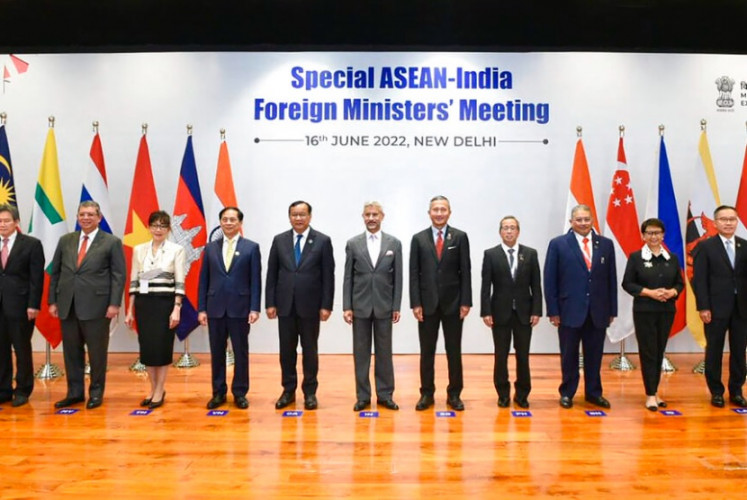Stop smoking service: A neglected public need
Indonesia’s total economic burden of cigarette smoking is estimated to be a striking Rp 600 trillion (US$ 43 billion), and the diseases attributed to smoking lead to no less than 200,000 deaths per year.
Change Size
 A certain incentive scheme can also be introduced for health professionals who successfully help a smoker to quit. (Shutterstock/Fresnel)
A certain incentive scheme can also be introduced for health professionals who successfully help a smoker to quit. (Shutterstock/Fresnel)
T
he last day of May is marked as World No Tobacco Day. Yet for Indonesia, being free of tobacco is seemingly still out of reach. One of the biggest hurdles is the absence of smoking cessation services in most parts of the country.
Today, approximately one third of all Indonesians are smokers. The country’s total economic burden of cigarette smoking is estimated to be a striking Rp 600 trillion (US$ 43 billion), and the diseases attributed to smoking lead to no less than 200,000 deaths per year.
In the last few years, the landscape of tobacco control in Indonesia has been dominated by efforts to restrict cigarette advertisements and to raise taxes for tobacco products. But where should smokers go to seek help when they want to quit smoking?
Data from the United States Centers for Disease Control and Prevention suggests that seven out of 10 smokers want to quit completely, and half of all adult smokers had attempted to quit in the previous year. However, quitting can be a tough row to hoe. According to a recent study, a smoker could have as many as 30 unsuccessful attempts before successfully quitting.
Research suggests that nicotine found in cigarettes can be as addictive as heroin, cocaine, and alcohol. Attempts to quit often fail due to withdrawal symptoms, including feeling anxious or irritable, having trouble thinking, craving tobacco products and feeling hungry. Luckily, smokers can improve their chance of success by accessing some type of medical intervention, such as counseling, support groups, behavioral therapy and medications, including nicotine replacement therapy (NRT), bupropion and varenicline.
Given Indonesia’s current number of smokers, the need for smoking cessation services is enormous, but far from adequate. Services are still limited to some hospitals and primary care centers, and potentially helpful medication is seldom prescribed. The Health Ministry has launched a toll-free consultation hotline for those wanting to quit smoking (0800-177-6565), but how it is supposed to meet public needs remains the question. As stated by the National Commission on Tobacco Control, consultation services for smoking cessation have not been integrated into the national healthcare system.
This fact is deeply unsettling. Considering that tobacco-related diseases impose a tremendous burden on the National Health Insurance (JKN), such preventive measures could actually save the national budget.
Incorporating smoking cessation services into the minimum service standards of community health centers (Puskesmas) might be a good way to kickstart a nationwide implementation of the program. However, the introduction of new services to the system requires a meticulous economic calculation and systemic analysis on the capacity and readiness of primary health care facilities.
To date, pharmacological therapies for smoking cessation, such as NRT, bupropion, and varenicline have not been supported by the JKN. Likewise, diagnostic tests to monitor the success of therapies are not available in primary care facilities.
Unlike funding, which is a major issue, but can be overcome by raising cigarette taxes, human resources pose a greater challenge as a shortage in manpower and lack of competencies can hinder the program’s success. Most contacts between smokers and health professionals in the community take place in the primary care center, namely Puskesmas, and private clinics.
However, even the harm caused by secondhand smoke is rarely discussed in the interactions between patients and physicians in Indonesia, a study shows. The massive workload of healthcare providers might play a role, but clearly, physicians and other health professionals lack the confidence to provide the service, owing to lack of education in the area.
Only a few higher education institutions have adopted counseling skills in the health professionals’ curriculum, despite the fact that the best time to introduce them is during their training. Pharmacological therapy for smokers is also rarely taught.
Some light at the end of the tunnel was visible in 2012 when the Indonesian Doctors Association (IDI) decided to introduce the skills into the National Competency Standards for Physicians. However, nursing and public health professions, who are in contact with smokers most often, have yet to follow in their footsteps.
To help remove the barrier, the government can facilitate the development of a smoking cessation module for health professionals and support capacity building of the faculties. Also, smoking cessation counseling and related therapies should be included in the national competency tests as a requirement for obtaining a professional degree. That way, higher education institutions will be prompted to add the competency into health professionals’ curricula, from in-class teaching to clinical rotation.
Services should then be designed to reach out to active smokers and operate outside office hours to accommodate adult smokers, mostly men, who generally work during the day, or be integrated to a workplace setting. A certain incentive scheme can also be introduced for health professionals who successfully help a smoker to quit.
In the end, the government must understand that only with a strong political will and systems thinking can they provide quality smoking cessation services to the public. They must embrace the principle that health is a human right, and their failure to be present in the efforts of health promotion and tobacco-related disease prevention is to ignore a social injustice.
***
Samuel J. Olam is a researcher and assistant lecturer at the School of Public Health, in the University of Indonesia (UI). Candrika Dini Khairani is a member of the Indonesian Young Health Professionals’ Society.









